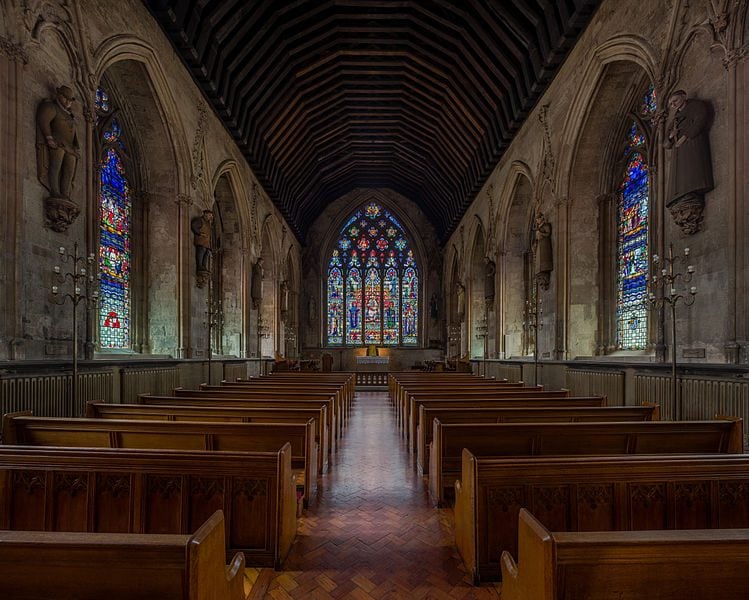
So this is the sort of post that is less than ideal because at least a small number of readers know me in real life, and will say, “why don’t you talk to people about your concerns directly?” but, eh, it is what it is. (And I know I’ve griped about these issues before and am not linking to past posts but I think I’ve been reasonably good about tagging posts so that you can follow those tags.)
Regular readers will know about my longstanding gripes about my parish, as I attempt to gain more help with coffee & donuts and come up empty week after week. (It’s gotten somewhat better, and there are a few families that I am able to recruit day-of, and I’ve been doing this on a week-by-week basis lately rather than making an overdue renewed push for volunteers, but I still get a lot more, “than you for doing this” than “how can I help?”) And we’ve got all manner of troubles in terms of attendance, involvement in activities, parish school enrollment, etc.
And yesterday there appeared a note in the bulletin that our pastor was retiring at the end of the fiscal year (that’s June 30th), two years earlier than he otherwise would have, because it would be “our turn” for the Reform My Church program in 2022 and it was thought best for the new pastor to be integrated into the parish by the time all of that started. But then at mass yesterday, the announcement he made was quite different: that for unnamed health reasons, the bishop (was this Cupich? the auxiliary bishop? I have no idea. Maybe it was just a faceless HR manager) told him to retire immediately — as in, as of last week. In the corporate world, that would mean he was canned and told to pack up his office immediately so as to lose the ability to cause trouble by accessing the server, files, etc. But — and this I don’t really understand — he said that he is actually going to be an associate pastor somewhere else, while we get an administrator (a pastor from another church who has official management responsibility over ours as well) for the duration until we get a new pastor, and this just seemed odd. Does that mean that the job of pastor uniquely comes with so many meetings and burdensome administrative work that to be an associate pastor is, for an experienced pastor, a sort of semi-retirement?
But at the same time: well, let me provide a bit of background before I continue.
Our parish, built in the postwar suburbanization boom (1955, to be precise), is a bit under a mile south of the historic downtown/train station. An equal distance north of the train station is the older parish. When I first moved into the area, over 20 years ago, I attended each parish for a while before I settled on this one; the other one, when it had its suburbanization-fueled growth, rather than expanding the existing church, adopted split worship services with (literal) church services being relatively traditional and “gym masses” being very contemporary. I was not a fan of this split, or of the fact that it made for two different worship styles that tended to become more extreme versions of themselves, rather than a balance of different styles of music. (Just in the past year, they finally added on to their church building and now hold all masses there; I haven’t been there since this addition was completed so I don’t quite know how it looks but they have quite the schedule, one every hour and a half in the mornings.)
And over time — well, its in the nature of such things, I suppose — that as a new generation not beholden to the concept of “parish boundaries” came into adulthood, a certain number of them that were drawn to the contemporary choir-masses attended the northside church even though they lived in what would have been our parish boundaries, and little by little, their parish became stronger and ours weaker, as new residents (or newly-adult residents) in the general area who wanted to be involved in parish life were attracted to their greater offerings — a parish theater group, groups promoting social justice, “small faith-sharing groups” and so on. And I don’t really know what their attendance numbers look like relative to ours, but I suspect that if one looked at their membership roster there would be a significant number of people with addresses in our traditional attendance area.
It’s a sort of slow-motion death spiral as our parish struggles to find people willing to get involved in parish life and to offer the sort of events and groups that the other parish has, because for any given individual, it’s a lot easier to participate in what already exists. (Are they also better at the things that Catholics generally do a terrible job at, like welcoming visitors? I don’t know.) And no, we’re not dying in a “pews are always empty” sort of way; it’s just that it’s a steady decline with no sign of improvement.
And our new void in leadership (which compounds an earlier void as the “pastoral associate” left and was never replaced; I don’t know why but I can only guess for budgetary reasons) doesn’t help matters any.
Now, if we were speaking of a secular club or business, the answer is simple: “if you can’t compete, then sucks to be you, but that’s just how it works. Your club/business will close down, they’ll expand and be more profitable and open another location, and if you couldn’t compete it’s no loss to the market anyway.”
But as a part of a greater whole — by which I mean, in this case, organizationally, structurally, a part of the Archdiocese of Chicago, not the Christian/Catholic Church broadly speaking — it does matter and it is a loss.
Cupich is just one of many Catholic leaders who sometimes speak as if “Catholic” is a sort of ethnic identity, and if it’s fading because certain ethnicities are fading in a given area, oh, well, nothing to be done about it. They also speak as if their job is to provide pastoral care for their constituency, and if that constituency disappears in a given locality, well, then that’s just how it goes, nothing to be done about it except right-size the infrastructure accordingly. (Does Cupich understand that he can’t even rely on Hispanics to be loyal churchgoers anymore, either?) He also sometimes speaks as if he expects that the Catholic Church will simply shrink in size and there is nothing he can do about it; though he does also sometimes speak of evangelization, I cannot easily reconcile his statements unless he understands evangelization quite differently than I do. (This is, of course, in contrast to places like Germany where there’s a very intentional accomodationalist effort, with leaders like Marx seeing themselves as the Official Spiritual Care Providers for the country and adjusting doctrine accordingly.)
So anyway, our parish could use some help from outside but none seems forthcoming. And I’m increasingly skeptical. What does it mean for our turn at Renew My Church to be coming in 2022? Will we get a pastor who has the skills and energy to inspire people and try to turn things around, or is it already taken as a given that we’ll get a caretaker pastor similarly close to retirement so that Cupich will be able to declare that we’ll merge with no great loss to anyone, and no one really notice one way or the other if our church building becomes a secondary location for overflow masses until such time as it no longer is needed. Looking around at the Chicago Catholic website, maybe I’m just a dolt and Renew My Church inevitably means that every parish is slated to merge with other parishes and it’s merely a matter of whether your parish comes out on top in terms of preserving your particular church and school building, your parish’s traditions, and so forth.)
I should also add that there’s something going on in the archdiocese called the “Parish Transformation Initiative,” which, to my understanding, is supposed to be about helping interested groups of parishioners identify their unique strengths to build on them, in order to, as the name of the program says, transform the parish (and, yes, boost attendance, and involvement, and offering plate collections).
And our parish ought to be able to build on its more traditional church building and past traditions of a more “high church” liturgy (though they’ve disappeared for the most part) and actually differentiate itself in positive ways from our “competitor” but it seems as if whatever energy there is seems to be directed at “we should be just like them” which simply won’t succeed and would be a loss for the wider community if it did, as we don’t need all parishes to be exact clones of a single “contemporary liturgy, social justice focus” parish just because that’s what worked for them. Near as I can tell, there is no parish at all nearby which focuses on a traditional “smells and bells” liturgy, or even incorporates that every now and again.
But I am starting to wonder if this Initiative has passed us by, or was done completely behind-the-scenes and was a bust, or if it’s slated for after some planned merger that the archdiocese has in mind for us. Looking online, a 2015 article says that, three years in, half of the archdiocese’s parishes have participated; simple math says that for years after that article, all the remaining waves ought to be finished. The archdiocese Parish Transformation blog ends in 2016. Should I ask around at the parish? Maybe, but one of the flaws of the parish is that there’s no particularly good communication of who to ask these sorts of questions of. Heck, I don’t even know, if I had to talk to someone in the midst of a spiritual crisis, who I would talk to. (Update: I did some more looking and concluded that when they started up Renew My Church they deactivated the Parish Transformation program so it’s either “a too bad, so sad, we’ve got other things to spend our money on” situation, or despite the glowing reporting, it didn’t really make that much of a difference anyway.)
So that’s my rant for the day and it’s time to move on. I could continue on with complaining that Cupich is more interested in social justice activism than helping parishes, but I’ve kind of lost energy for that. He is who he is.
Image: https://en.wikipedia.org/wiki/File:St_Etheldreda%27s_Church_Interior,_London,_UK_-_Diliff.jpg; Photo by DAVID ILIFF. License: CC-BY-SA 3.0











